Also - See photos and comments from other
CES & ICCE,
CinemaCon(Showest
),
CTIA,
SCTE |
| Get on our distribution list - click here |
|
|
|
CES Pre-Show & Press Events |
|
|

|
This is perhaps the most unusual product seen at CES. It is a $100
semiconductor chip called the ION 314 (other versions exist) that sequences
DNA in about 1.5 hours! OK, a few details were omitted - this chip is
used once, and it plugs into a $50K machine about the size of a microwave
oven and it doesn't sequence the complete DNA chain, but a healthy part of
it (a complete sequence takes 8 hours). But, it is relatively simple
to use, versus existing optical-based systems. Not your everyday
consumer electronics, from
Life Technologies. |
 |
 |
There is a trend towards mobile health monitors. Here you were this
on your wrist and it transmits your vital signs to the Cloud via Sprint's
mobile phone network. It will be priced between $159 and $179,
depending upon configuration. No word on Sprint's cost.
Body
Media Fit will be introducing this special wearable monitor in 2013. |
 |
Zomm has another example of mobile health monitoring. The small
device ($199) on the left reads a variety of health monitoring devices via
Bluetooth. It then sends information to a smart phone for
transmission to a "consierge" service ($15/month). The phone's GPS
and monitor info is used by the service to determine best course of action.
Sort of an "OnStar" for your body. |
Nest (nest.com) is taking the thermostat to a new level. It learns
the best settings for your heater and air conditioner by
the settings you specify manually, the room's thermal
characteristics and sensors that detect if people are in
the room. The device's setting is controlled by a
dial on its edge. You can get efficiency charts,
too. So popular that they are sold out after
introducing it just a few months ago at $249. |
 |
.Cute iPhone accessory from
GoPano - it lets you take 360 degree photos AND
videos. You view them live or afterwards. Swipe your finger
left and right to turn your view. This was introduced a couple of
months ago. The "Micro" for the iPhone costs $79. They have a
larger version for SLR cameras and video cameras that costs between $700
and $900, depending upon version. |
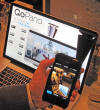 |

|
HP bought a company called Autonomy (with a little controversy) last year.
Buried in this company was a technology they call
Aurasma. You use
your phone (or iPad) and point it at something. If the app recognizes
it, the image is replaced with related video. Here the magazine cover
is replaced with a video of the car seen on that cover. You can mate
all kinds of images to all kinds of videos. Sort of spooky to see it
in action. Currently, this is a free app, but it may not be forever. |
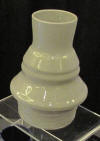 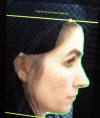 |
Speaking of spooky - here is an unusual application of 3D printing from
Sculpteo. The vase that you see was made by using the profile of the
person's face, shown below. It takes 1 hour to print 1 cm (high) of
the final product. You can order a vase like the one you see for
about $300 (takes about 3 weeks). Smaller items are $70. |
Social Networking has invaded Radar Detectors with this
Escort Live product. The radar detector
communicates with your smart phone to send the lcoation
of radar speed traps when they are detected. The
phone's app reads the same database and tells you if you
are approaching a speed trap that others have found.
$139 for the device and the service is currently free
during 2012. |
 |
Another use for your iPhone or iTouch - here we have the Woogie from
Griffin Technologies. Simple app lets you play with Woogie's face and
expressions. $30. It has been said that babies know how to use
an iPad, but after playing with one they try to use the same finger
jestures on magazines and photos, too. |
 |
 |
A couple of more spy-on-you toys here - these are from
Interactive Toy
Concepts. The car is $99 and the helicopter is $120. Both use
Wi-Fi direct to your iPhone or Android to let you see videos of what they
are spying on. Available September 2012. |
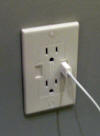 |
We started the day with DNA sequencing, and end it with a USB charger built
into your wall, so you don't need to worry about that little power adapter.
This comes from
Other World Computing and they call this UL approved
product Power2U. $27. Life's little pleasures. |
|
For the past many years mfrs have shown early OLED TVs.
OLED offers many advantages, but it has suffered from
various problems concerning life and reliability.
It is now getting robust enough to show in sizes large
enough for your living room. This one from LG is
55 inches and has a 4mm bezel and weighs half the weight
of LCD TVs. More on this later. |
 |
Expect a lot of Smart Phones this year, as this is still one of the growth
segments in Consumer Electronics. The unit on the right is LG's
Spectrum, which works with Verizon's service. A unique feature is the
ability to work in two modes - business and personal, so that your business
phone can be used for personal stuff without getting your VP of IT mad at
you. It also is marching along with a 720x1280 HD IPS LCD display. |
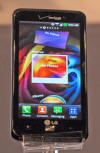 |
 |
Sharp wanted to show just how big their 80 inch LCD/LED TV is by mounting
it above a car. Actually, I have to share that this display actually
made the TV seem smaller. Nice try. The TV itself is nice, with
matrix LED backlighting and their four-color LCD filter (Quattron) and
their "Smart Central" Internet functionality. But wait, they will
soon be showing an 85 inch TV with 8K resolution (this is 16x the number of
pixels of an HDTV). |
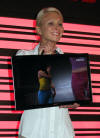 |
Years ago my dad was watching TV in the car while my mom was shopping.
It was a 4 inch battery powered TV. Reception was poor, so he started
to drive the car back and forth to get a better picture. Now, with
Sharp's new 20 inch LCD TV you can move your SUV back and forth. This
TV has a built in battery and even has a handle. They showed larger
TVs, but these were powered by an off-board battery (and probably an
inverter) hidden in a pouch that the person wore. |
Are you the CEO of a big company? Put a Sharp
Aquos Board in the boardroom where you used to have a
screen and projector. It uses a special electronic
pen to let you poke at buttons and draw circles &
arrows, etc. Might also be easier to clean if
someone picks up a permanent magic marker and writes on
the screen. It is interesting to speculate how long it
will take to get prices low enough that more than fancy
board rooms can afford this -
five years? |
 |
Do you need to transfer a file from one person to
another across the Internet, but worry about security?
Put one of these iTwin USB devices in one PC and the
other iTwin in the second PC. The file is
encrypted useing AES256 and is sent across where it is
decrypted. $99 for a pair. |
 |
 |
Of course, not to be outdone by LG, Samsung rolled out their own OLED TV -
this one is also 55 inches. It is their top of the line, so this one
has all the features, including gesture control, voice control, facial
recognition (so it goes to your own home page), 3D, all kinds of
applications, and the ability to upgrade both the hardware and the software
in the future. If you look closely, you may notice the real news is not
OLED, but something more subtle - that Samsung has taken the TV to a
new level - it is now more of a platform than a TV. This platform
happens to include a TV, but it opens up a wide new way of thinking in
applications, content and services. |
 |
As TVs morph into a big iPad and game machine type platform, complete with
jesture and voice controls, Samsung is making sure that their apps, content
and services story will be robust. This includes Angry Birds games
and annimated cartoons (free), but it includes a much wider set of
offerings, with more to come. It used to be that you only got shows
for the home from the TV networks - now everyone, including Samsung, is
racing to create what amounts to their own "network". Sounds exciting
perhaps, but we are now entering a multi-ring circus that will take a
little time to take shape. Some have called this "Over the Top" TV,
but to do so misses the point. |
|
Panasonic's executive is holding a Skype appliance that
makes it easier to make video calls. Not too much
was said about this product. |
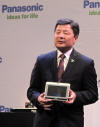 |
Panasonic continues to emphasize 3D. As you may know, the only way to
get Avatar 3D is via Panasonic. Now they are teaming with NBC to
shoot the London Olympics in 3D, with over 200 hours of coverage planned.
Seen on stage are various NBC and Panasonic execs. |
 |

 |
Panasonic drew the most attention with the announcement by Myspace's Justin
Timberlake and Tim Vanderhook about Myspace TV, to be found on Panasonic
TVs. The idea is to integrate the social network experience into the
TV viewing experience. One can share clips, see trends, chat, etc. |
 |
Panasonic talked about, but did not show, a new 4K display in a 20 inch
format. So far everyone else has been showing off 4K displays in
typically large sizes. By coming out with this display Panasonic
hopes to open up commercial and medical applications that need extreme
resolution in more of a workstation format. |
|
Qualcomm is moving into eReaders with their Mirasol
tablet. They offer it with a service called Kyobo
in Korea, and are moving into China with a company
called Shanda. The reader is a reflective color
display with LED side-lighting that adjusts to ambient
lighting conditions. Batteries las for about 3
weeks of typical use. |
 |
A company called Basis sells a product called the band (mybasis.com) that
monitors your heart rate, steps taken, skin resistance and body & ambient
temperature. From this, they can tell you all kinds of things about
your body, including how long you've been sleeping last night. $199. |
 |
 |
A company called Peel sells this little device that helps to take commands
from your iPhone or Android and control your TV, etc. Thing is, the
path is via Wi-Fi to ZigBee to IR, making it a bit convoluted. They say it
makes their system more flexible. $99. |
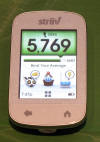 |
This is a small device about the size of a business card that has an
accelerometer and altimeter in it so that it can track your walking. $99.
Fancy graphics caught my eye, but I'm not sure if all of the value is
there. |
|
Fujitsu sells this Arrows tablet in Japan. Note
that it is operating under water. Several phones
in Japan can do the same thing, solving a problem for
some butterfingers. |
 |
Load up the
Fisher Price Kid Tough DVR with cartoons and let your 3 year
old watch them on long trips. It is meant to be easy to use and
rugged enough to withstand kid abuse. $150 in June 2012. |
 |
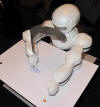 |
Tosy makes this little "robot" that sits there and draws all kind of
pictures with a pen. Sort of reminds me of the old HP plotters that
moved the pen around the paper (instead of moving the paper under the pen).
They call it Sket Robo and it will be about $50 in September. |
 |
Winning the prize for cuteness, the same company Tosy will also offer the
Disco Robo. It hears the music and dances to it. If I get the
time, I'll post a video. Available June for about $40. |
|
Native Union
sells this little "Play" device that lets
you record up to 3 minutes of video. You slap it
on your refridgerator and a light blinks to tell others
you've recorded a message on it. Press the play
button and you see the video message. $60. |
 |
Stick a micro-SD card itno one of these characters and you have a USB
drive. I have Yoda. $13 from
Mimoco |
 |
 |
OK over-clockers - now you can have a water and thermal-electric cooled PC.
Water cools the graphics cards while the thermal electric cools the CPU so
you can run your PC at greater then 5 GHz clock rates. Digital Storm
sells versions that cost between $3K and $10K, depending upon how fast you
can twitch. |
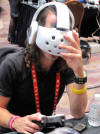 |
This helmet from Sensics is called the Smart Goggle. It provides two
1280x1024 displays for 3D vision & stereo sound, coupled with a 6-axis
sensor and 11 video cameras so that it can read your hand jesters and
position. It has GPS, 3G/4G, HDMI, Wi-Fi, BT, USB, SD. It is meant to be
the ultimate in virtual reality head gear. No price yet, but they
hope to get it out by the end of this year.
smart-goggles.com |
|
Everyone was wondering why Canon hasn't yet come out
with a G13 camera to replace the G12. Well, Canon
intends to keep the G12 around a while creating a new
platform called the
G1X. This has a 1.5" 14
megapixel sensor. It offers perhaps 5 F stops
better low light performance. Many things are
similar to the G12, but optical zoom is only 4X.
Available in February for $800 |
 |
This little toy ball rolls around the floor based on the commands and
jesters you send with your phone. Orbotix offers this as their Sphero
(gosphero.com) for $129. |

 |
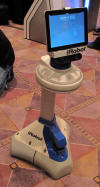 |
iRobot showed off their AVA robot. It is not a real product yet,
though a version of this is being made for a medical application
(telepresence for the doctor). It uses 3D imaging, laser and sonar to
navigate and avoid bumping into objects and people. People can
interact with it with voice, gestures and touch. The height adjusts
up and down as needed. It doesn't do windows. |
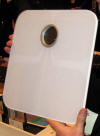 |
Now that the holiday season is over, it is time for all of the diet plans
to come out. To help you along we have
FitBit's Aria. This is a Wi-Fi
scale that sends your weight off to be tracked and charted. No more
sneaking off to weigh yourself in private. You can buy this in April
for $129. |
|
CES - Day 1 |
|
Sony will be introducing their Tablet P this
Spring. Its unique design folds 5 inch displays in
two. You unfortunately see the seam between the
two halves, but it generally is OK for web pages.
Movies, when viewed, are seen on just the top display.
It is also a bit thick when folded. It will work
with AT&T's "4G" network, and so final pricing will be
set by them. |

 |
This Sony camcorder projects video that it has captured
through a mico projector built into its viewer.
This year's model can project a 100" image from 10 feet
away (in a dark room). The photo on top was taken
in a bright area, so it doesn't look as impressive.
$1299. |

 |
 |
Unfortunately, trying to show image quality on a webpage
is not easy to do, so trust me when I say that there is
a noticeable difference between these two displays.
Sony is showing a prototype LED display that is brighter
and faster. Unlike the so-called LED TV's at the
store that are really LCD TV with LED backlighting, this
display is a direct view LED design. Each pixel
consists of three LEDs (RGB). No avaiablility. |
 |
This is a binoculars device that records 3D HD from the
images you are looking at. It comes in 10x and 20x
zoom. Images are stabilized and autofocus because
you are really looking at a pair of small LCD displays.
This fact becomes evident in low light when the viewer
switches to a low light mode. This was introduced
last August and costs $1500 - $2000. Popular with
coaches that capture plays for analysis after the game,
and with bird watchers with lots of money. |
|
Sony Style in action here with a set of Wi-Fi speakers.
The "NS" line costs $200 to $400.The newest models come
out in July. |
 |
Sony previewed a prototype version of this Personal 3D
viewer last year. They have since put it on the
market and you can buy one for $799. |
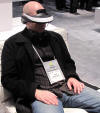 |

 |
The photos to the left are the front and back views the
remote control designed for Google TV. A couple of
features that you can't see are a microphone for voice
recognition and commands, plus gyros for gaming. |
 |
Here is a screenshot from Google TV showing some of the
apps. Google TV is supposed to be easier and more
useful this year, but unless you have the inclination to
deal with all of its features, you'll probably still not
find it worth your time and money. If you think
you do, however, you can get it via a dedicated box or
built into one of Sony's Blu-ray players. |
|
Panasonic spent a little time promoting their interest
in 3D yesterday. Here are some 3D cameras to
match. The new DMC-3D1 on the left might be the
best choice for people that want to try out the idea -
it goes for $499. |
 |
This is a close-up of the Skype appliance that was shown
yesterday by Panasonic. The reason that not much
was said about it is that it is still a prototype. |
 |
 |
You might not know it, but Panasonic has an automotive
division, and here they are showing the control panel
that they designed for Chrysler (another one exists for
GM). Unlike the Microsoft Sync found in Fords,
this panel is an understated and more traditional
control for your radio, navigation (Garmen) and HVAC,
etc. |

 |
More on Panasonic's Myspace TV. The top picture
shows a screenshot of Myspace TV while the viewer votes
for various shows. These votes are collected and
everyone gets to see the results.
The second photo
shows how their application can listen to the audio from
the TV and recognize what show it is. It then
pulls up appropriate content from the web that matches
what is on TV. |
|
Here is another shot of Samsung's 55 inch OLED TVs |
 |
The product on the right is the Samsung Galaxy Note.
It has a 5.3 inch AMOLED display. I put my iPhone
next to it for size comparison. The note has the
usual features stuffed into it. It uses Android
Gingerbread, but will be upgradeable to Ice Cream
Sandwich. It has a small stylus that you use for writing
(like a pen). This stylus has a button that lets
you invoke certain features. |
 |
 |
While everyone else is proud of their 4K TVs (even
though you can't take real advantage of all that
resolution yet), Sharp showed off their 8K display.
Have to admit that it looked really good. Makes
scenes more life-like. This is just a prototype,
so don't throw away your old 60" TV yet. |


|
Last century I remember when Comdex was still king, but
both Microsoft and Intel decided to start showing at
CES, too. Their first booths were mere edited
versions of their Comdex booths. They evolved to
be more CES oriented (and Comdex died). Now, with
Microsoft announcing that they won't be at CES next year
pundits are saying CES will go away, too. Not so
fast. While I think that Intel will finally figure
out that they are wasting their money at CES, the
industry on the whole continues to evolve and CEA seems
to be trying to evolve with it. There is some risk
that CES will be too diffused, as it is certainly too
big for many, but don't expect it to go away. |
|
My son sometimes packs up his game console and goes over
to his friends house to play games. With the
Gaems
G155 you have everything you need in one carrying case.
There is even room for batteries. Microsoft is
going to sell a bundle build around this. Under
$300. |
 |
This "clock" from
Gear4, called the Renew Sleep Clock,
claims to be able to wake you up at the best time during
your sleep cycle. Thus, you have a more restful
full sleep. Some kind of sensor that was explained
to be a type of radar measures your breathing patterns
and movements in bed without you having to wear any
sensors. It tracks your sleep and reports a number
of parameters to you. If you are in a deep sleep
it will wait a bit before trying to wake you up.
The iPhone/Touch is used to show sleep reports and play
your music. Available February for $199. |
 |
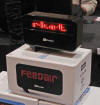 |
This little device from
Feedair scrolls messages of your
choice (stocks, weather, text msgs, etc) on the tiny
display. A gift for the person that has everything.
Available in March for $50. |
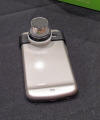 |
360 degree video from your phone must be hot because
here is another product that lets you capture it on your
iPhone now ($79) and Android later (2nd half of 2012).
This product is a bit more compact then the first one,
but does present a challenge in holding the phone the
right way.
Kogeto
calls this the Dot |
|
Smart Cards have never taken off in the U.S. like they
have elsewhere. Nagra is hoping this ID Security
card has better traction. Among other things, for
online purchases you can use a code that appears on the
small display in the upper right corner to buy things
instead of sending your credit card info over the
Internet. Each time you use it a different code
appears. Typing a challenge code into the card is
part of the process. About 20 banks around the
world, but not yet in the U.S. are using it so far. |
 |
How would you like to pour a little water into a device
and get power to charge your phone in return? The Power
Trekk from
Signa Chemistry does just that. In the
top photo you will see small round cartridges that
extract hydrogen from water and then another converter
uses the hydrogen to generate power. One cartridge
cost $4 and is the equivalent of 6 AA batteries (5 W
Hrs.). Expect to see this at REI in May.
If you
need more, their DPS300 can use the same fuel cell
techniqaue to generate 800 W Hrs. The cartridge is
a bit larger, but it outputs 110V, 48V, 12V and power
for USB devices. |

 |
|
|
|
|
|
|
CES - Day 2 |
Taking a quick pass through the "South Hall" of the Las
Vegas Convention Center where one can expect to find the
unexpected (Big brands like Sony, Panasonic, Samsung and
LG are in the "Central Hall").
The South Hall
is two levels, each larger than an aircraft carrier, but
with more people. |
 |
This little toy for the person that has the money ($30,000) was seen in the
NVIDIA booth. It has it all - screens are in 3D, big sound, seat
rumbles and moves. It is said that customers include race car drivers
and CEOs - wonder what the common trait is... |
  |
YC Cable has this $79 remote control for your TV, iPhone or iPad, etc.
It links to an iPhone via Bluetooth, for example. The TV remote learns from
your existing remote. It is about the size of a regular remote. |
|
Seal Shield sells this Flexboard SSF106 keyboard for
$29.99. Unlike some similar keyboards, key
contacts use four points to increase reliability and
tactile feel. Rolls up to a relatively small size
and unrolls into a full sized keyboard. |
 |
This little tool puts 3D printing within grasp of a hobbyist. At
$1799 ($1999 for two color)
Maker Bot Industries will sell their
Replicator. It takes standard STL files and makes a 3D print within
hours. It uses ABS or PLA plastic, so it can be fairly durable.
The plastic comes in spools (15 colors) that cost about $20. an
object roughly 9 x 6 x 8 inches can be made on their newest model just
introduced. To to thingiverse.com to see what people have made, or
download free files and make it yourself. |

 |
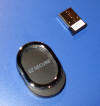 |
Plug the small USB device into your PC and carry the little dongle with
you. If you walk away from your PC the screen is locked and unusable,
even if you unplug the USB device. VuPoint Solutions sells this
EZ-Secure for $30. |
 |
Last century, one of my engineers asked me for my approval to buy a 25
Megabyte disc - it was the size of a dishwaher, but cost more. Now we
have Victorinox and their Swiss Army Knife with One Terabyte of encrypted
storage on a USB stick. Prices are still more than a dishwasher -
$3,000. |
|
Genius has put a presentation mouse
and laser pointer into a ring. Now you can make
sweeping arm jesters on stage and drop the
clicker/laser. Adjustable mouse resolution between
250 and 1200 dpi. Available in April for $70. |
 |
Blue Microphone will be selling this Tiki microphone for $59 this Spring.
It has DSP circuitry so that it cancels out background noise (including
clicks from your keyboard) as you talk. There is a an extender cable
if you want to put the mike somewhere else. |
 |
 |
Forget those plastic and rubber bumpers for your iPhone or Android.
You need a solid metal bumper from
Gild Design Factory. It is hogged
out of a single piece of metal and is worth the $100 they charge, if you
are so inclined. |
 |
Now that Day Trading is back in style, you'll need this Emperor 1510 from
MWE Lab. The arm with three displays raises by motor so you can get
in and out of the countour chair. Any day trader should be able to
afford this at $6200. |
|
3DEE Central
is building a library of 3D content for
iPhones and notebooks. They have 150 titles so
far. Since your device may not support 3D, they
sell lens kits for various devices, including the iPhone
4S, seen here. The lens fits into a pocket when
not used, or on the screen if used. $30.
But, remember the Fisher Price ViewMaster? Turns
out they are going to put their library of 3D photos
into a library that you will be able to view on your
iPhone using this 3DEE Central lens! |
 |
Decades ago I was on a micromouse team that made an automous "mouse" that
successfully navigated a big maze, winning a regional 1st place. Funny
thing, it used no electronics, only a few microswitches (true story).
Well, now XYBotyx is about to sell their little platform that you plug your
iPhone into. This device then uses proximity sensors to autonomosly
run around the floor, etc. If you have a second iPhone, you can use
it to control the device, and even see what the first iPhone's camera sees.
$111.11 in February. |
 |
|
|
|
|
|
|
CES - Day 3 |
 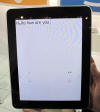 |
Here we have a rather unique keyboard - the top photo shows how the letters
are grouped by their graphic characteristics - see if you can figure it
out. Below you see the keyboard on a tablet in its normal mode, which
lets you see more of the page you are looking at. By tapping the four
symbols you can type out words because it sort of works like T9 does.
Snapkeys is trying to license this, and Philips has put it on their TV
remotes. |
 |
Everyone has cell phone covers, and many look similar. Valor's Mybat
brand of cell phone covers are truly unique and very artful. Here are
just a couple of designs from dozens that they have. The ones in the
photo go for around $25-30, but they have some that go for $10 to above
$100, depending upon materials and design.
store.mybat.com |
|
Here is another unique design for holding your stuff.
Up close it looks like a spiker from a Sci-Fi movie.
The legs articulate and can grab hold of things with
tiny claws. A clip or camera mount lets it hold
things like tablets, phones and cameras. Comes in
two versions - the Life Phorm ($69) and Life Phorm Pro
($149, fancier materials). Available in April from
Lethal Protection. |
 |
This might appeal to tailgaters and seniors in their motor homes -
Dish
Network
now has the Tailgater antenna for $350. It weighs just 10 poinds, so
you whip it out and place on a flat surface. 5 to 10 minutes later
you are watching all of your Dish TV channels. The antenna points to
the satelite automatically, so you don't have to align it yourself.
It gets its power from the Dish receiver, so you need one of these, too. |
 |
 |
With all the big TV mfrs showing off their 4K TVs, you'll need to upgrade
your camcorder.
JVC has a pro-sumer 4K camera called the
GY-HMQ10, and you can get one for about $5K. If the price is shocker,
remember that it wasn't that long ago when HD camcorders were this price. |
 |
Heading to the "PMA" (Photo Marketing Assoc) side tomorrow. In the
meantime, here are a few booth-babes, courtesy of Nikon.
(post event
note - all of the major camera mfrs. were only at the main convention
center and not at PMA. Nonetheless, there was some interesting items
at PMA - see below) |
|
This vinyl player is actually hanging on the wall.
A small cap holds the record in place. Runs on
batteries and has a built in speakers.
ION Audio
sells this fun product for under $50. |
 |
I thought the previous 3D printer was unique - now I find another one from
Cubify. They have several sizes, but this one can make an object 5.5
x 5.5 x 5.5 inches out of ABS. $1299 in May. $50 for a reel of ABS.
Other printers can handle other materials, such as nylon, and make
bigger parts. They also have a 5 color (Black, White & primary colors)
printer based on HP inkjet technology that prints full color objects. |
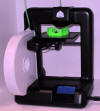 |

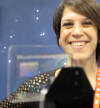 |
The glasses to the left let you view 720p stereo video through transparent
lenses. That is, if you wear these glasses you can still see around you.
The image is sent to the display area using a holographic light pipe
technique. You can see the image area in the lower photo - it is the small
frosty area. Images are full color and 500 nits, so it is viewable in
daylight. A military version will be made 3rd quarter that costs several
thousand dollars, but a consumer version is planned for 2013 for under $700
by Vuzix |
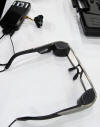 |
Just around the corner was
Lumus Ltd. with their version of a 720p glasses
system. It uses a different approach based on reflective optics, but
it works, too. They don't sell the glasses, but plan to sell the
optics for about $100/eye in 2013. |
|
What you can't see in this photo is that the dog's nose
sticks out of the frame a few inches. Talk about
"glasses-free 3D". You send your ordinary 2D photo
to Casio and they return a 3D rendition of it.
Casio uses a full color 3D printer of their own.
They call it "Digital Painting" and it will be available
first in Japan this Spring. It costs between $100
and $500, depending upon complexity and depth. |
 |
Simple little gift idea for the car buff - USB Car Mice sells these for
just $4. |
 |
 |
Yup, that's Justin Bieber holding Tosy's new mRobo Ultra Bass robot.
You load up its memory with up to 500 songs and let it loose to dance
around and play your music. Available this Fall for under $200.
If
you want to see a video of this event, it might be available if you
click here |
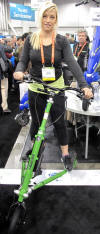 |
This is the 36V Lite from Trikke. Look closely and you will see she
is standing on two separate areas. This is battery powered and it can
go up to 17 MPH and has a range of 20 miles. The two legs fold up so
that you can carry it onto the train or bus. It weighs 40 poinds.
It was introduced a couple of years ago. You can get one for $1300. |
|
Moshi makes stylish accessories. Here we have a
Mac Book cooler (works on Air 13, Pro 13, 15, 17)
that folds up into a compact size. A small magnet pulls
out the USB cord for you. Keeps your Mac Book 12
degrees C cooler. It is called the Zefyr 2, and
sells for $79. |
 |
Qualcomm announced a new X-Prize that would be nice to see someone win -
make something inspired by the Star Trek Tricorder that can diagnose 15
diseases, as well as read several common vital life readings. Further, it
must be a portable device that a consumer can operate themselves without
the help of a medical professional. There is a $10 million prize.
Details are at -
click here |
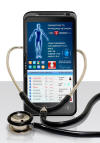 |
|
|
|
|
|
|
CES - Day 4 |
|
This year PMA (Photo Marketing Assoc) was at the same
time as CES
|
 |
Want to own your own drone?
CamOne Tec has their Pelicam that you can
get for $1500. It uses a 5.8GHz wireless link to control the electic
glider and send you HD videos. The onboard cam pans to match your
head's movement, so it is like being in the plane if you are wearing a
head-mounted viewer. It has GPS, so you know its position, speed and
altitude. |
 |
Portrait Weavers can take your digital photo file and return a full color
rug. It uses 6 color threads (B,W,R,G,B,Y) and can make a rug as
large as 5.5 by 10 feet. The one shown here is smaller (perhaps 3 x
4') and would cost under $160 (rod and delivery included). You can't
buy the machine - it is two stories high and weighs 22 tons.
www.portraitweavers.com |
This machine you can buy for just over $6K from
Brooke
International. It makes jigsaw puzzles from your
photographs. Puzzles can be as large as 12 x 18 inches.
brookcutters.com |
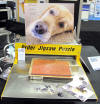 |
You can buy this machine, too, for $50K from
CNCA Laser Co. It is the
3D Photo Crystal maker. It takes your picture and then makes the 3D
laser cut images that you see in various plastic blocks seen in the top
photo. A small one takes 20 seconds to make, while a larger one
perhaps 4 minutes. |
  |
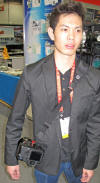
 |
If you are a camera enthusiast or professional, you may notice how standard
camera straps just don't seem to cut it. They can be uncomfortable to
wear and the camera is held in a less-than-optimal way. Custom SLR
has a couple of solutions. First, their camera strap, called the
Camera Split Strap is designed to fit better on the shoulder. They make
them for Notebooks bags, too (an I can attest to its comfort). $27.95.
Then they make the C-Loop HD which lets you attach the strap to the
camera's tripot mount. If you have a large lens you can use the more
balanced center point. It make it easier to "run and gun", if you
know what I mean - $34.95.
www.customslr.com |
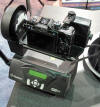 |
If you do a lot of panorama shots by stitching multiple shots together, you
should get the Epic 100 (or other models for larger cameras) from
GigaPan.
You set the upper left and lower right corners of your shot, or set it to
360 degrees. Set the camera to full zoom and start the shot. It
servos to each shot and presses the shutter. They have stitching
software, but you can use your own. $499 ($899 for cameras up to 10
pounds). |
|
Lensbaby has a number of interesting special effects
lenses for your camera. They have just about every
lens mount supported, but more are coming out in April.
The Composer, seen in lower-middle lets you put just a
portion of the photo in focus. Other lenses
include fisheye, flair, etc. The Composer is $250
to $300, and other lenses are $40 to $180. |
 |
The German company Minox might be remembered for the spy camera. Now
you can buy a 5.1 Megapixel digital version (DSC for $230). Or, if
you want a classic, get their gold plated DCC modle for $350. See the
penny for size comparison. |
 |
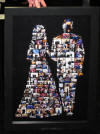 |
ScrapWalls lets you sent in a bunch of pictures and in a few days they will
return a mosaic in the shape you wish (they have 52 shapes, with more
coming). A 20 x 30 inch version costs just $30, while smaller ones
like 11 x 14" are $15. |
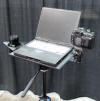 |
Tabelz sells a tripod attachment that can hold your notebook or tablet
while you out in the field,etc. Prices range from $90 to $130,
depending upon size. The camera mount that you see is their newest
product, and a price has not been set. |
Photographers may recognize the
Lenspen on the left, used to clean your lenses with
a carbon filter element ($9.95). Now there is the
Sidekick for your
Smart Phone ($14.95) that
is good for 150 cleanings (replacement cartridges $5). I
tried it and it works pretty good. |
 |
This speaker is about an inch and a half on a side and sounds bigger.
It is called the Z-Cube and is from
Zimri for $49.99. It will be
available soon at major retail stores. It has a battery and runs 4hrs
on a charge, so it won't drain your iPod. If power comes from the
USB, it runs forever. |
 |
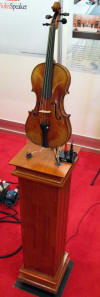 |
This is also a speaker. It actually sounds quite nice. A
subwoofer is hidden the post and tweeters in the violen. It will be
available at the end of 2012 from Hua Xing String Instruments and is called
the Sound Post. They have other versions, too. |
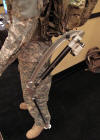 |
I am told that there are more injuries that solders get from carrying heavy
backpacks than other forms of injury. So, enter the Exoskeleton from
Springactive. It makes carrying a 90 poind backpack feel like less
than 30 pounds. If it is a 50 pound backpack, you don't feel
anything. Works for walking, not running or climbing. This is 3
to 5 years out. |
We are now moving into the "serious audio" section.
This industry values uncompromised performance, wrapped
in tradition.
Here we have the WM60 BAL AVR from
Torus Power.
Look at the before and after scope shots (1 volt per
vertical division, 20 kHz horizontal) to see how it
cleans up the AC going into your equipment. It
handles a 60 Amp load and filters out everything from 2
kHz to 1 MHz. It has very very low impedence, so
it can take an instance peak load better than
traditional power conditioners. $8200. |
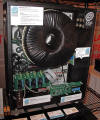   |
With all that power you need a power cord. Forget Monster Cable (no
offense) - here is the Gutwire SP-CE AC Cable. One cable puts you
back $1979. |
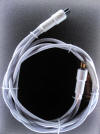 |
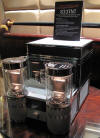 |
True audiophiles adhere to the warm quality that tubes produce. At
the extreme you dedicate one "Mono Block" amplifier to each channel.
Audio Power Labs makes this 200 Watt Mono Block called the 833 TNT.
You need a 20 Amp dedicated circuit per channel. The tubes come from
China and are normally used for power transmitters. A set of two is
sold for $175,000. |
 |
Of course, you don't want to play CDs on all this, but vinyl.
Music
Hall just introduced this nice turntable called the MMF 7.1. This is
not one of those radical platters that has a 4 inch high solid metal
platter, but is a more stylish product. It uses a carbon fiber arm and
isolates all of the motors. $1495. |
|
|
|
|
|
|
ICCE (International Conference on Consumer
Electronics) |
If you are not familiar with ICCE, think of it as the
R&D counterpart to the Marketing done at CES.
Why
would you care? Because the R&D folks are inventing the
stuff that you will see in future CES events,
only
they are talking about it now.
ICCE is run by the
IEEE Consumer Electronics Society |
|
Dr. Hiro Kawamoto is a Life Fellow of the IEEE. He
was the original ICCE Chairman 30 years ago. He
has worked for Panaonic, RCA David Sarnoff Research,
Sony, Sharp and Silicon Image. He has followed
display (LCD) technology, and he gave a short talk on
the state of displays. You might find a couple of
his slides surprising. One of his points is that
even though LCDs were nominally invented in the U.S.
(there is some dispute here), it quickly centered in
Japan, then went to Korea & Taiwan, and now is in China
- but, China may only be the center for LCDs for 5 more
years before it moves onto another lower cost country. |

 |
This multitouch technology was shown at CES next to the Sony booth, but I
did not think it was anything new until they showed it at ICCE. It
uses an array of IR cameras behind the LCD display to pick up placement of
muliple finger touches. Most multitouch displays use a
capacitance-based sensing system.
MultiTouch Ltd
says their system is has faster response and demonstrated it by showing a
simple game (top photo) that required quick action (it is sort of a hockey
game) |

 |
 |
Imagine watching a sports event on your TV and you
decide to look around a bit - that is, as if you were
sitting in the stadium and you turned your head.
This paper hints at some of what is needed to make this
possible - click here |
 |
Have you noticed those ads that show people that are watching 3D TV?
The ad sometimes shows these people trying to grab something in mid-air
that is not there. Samsung is working on a way to let you "touch"
things that are "floating" above the screen. You point to a button,
for example, and the screen interprets your intention as wanting to press a
3D button. They describe some of their work
click here |
Current touch panels do not detect how hard you are
pressing, unless you are using an active pen.
Further, if you are using a stylus to do handwriting,
your palm might cause errors because the display detects
your palm as another point. A group in Taiwan
showed a display that uses a capacitive-based sensor
that can detect how hard you are pressing and avoid
errors from your palm. To demonstrate it, they
showed someone "playing" a "piano" where pressing the
piano keys harder made a difference. Another demo
showed a finger painting a thick and thin line,
depending upon the finger's pressure.
click
here |
 |
Converting a 2D picture to a 3D image without any manual help seems like
magic - and, it doesn't always work well. The wave of TVs with
2D-to-3D features is an example early techniques with dubious results.
While TVs can take advantage of inter-frame information to help determine
depth, how does one do 2D-to-3D for a 2D photograpgh? This paper
shows how a number of techniques can be combined to produce fairly good
results for many types of images -
click
here |
 |


 |
Dr. Martin Kienzle of IBM Research talked about the
approach they are taking for Cloud-based Consumer
electronics and services. They see their role in
the Cloud infrastructure where systems are quickly taxed
once such systems become common and data volumes and
demand for quick response times increase. In
typical fashion, IBM manages to describe the challenges
in a way that makes them look very complex, and of
course IBM is there to help companies sort it all out
and tackle them. |


 |
There is a very good chance that you have used the technology that these
three men (center) helped to invent. (left - right) Gary Sullivan,
Gisle Bjontegaard, and Thomas Wiegand are this year's winner of the IEEE
Masaru Ibuka award, given to people with outstanding contributions to
Consumer Electronics. They invented what you might know as H.264, aka
MPEG4/A - a video compression technique that is roughly twice as efficient
as MPEG2 (used in standard DVDs). Why do you care? It means less bits
used to send good video, so your smart phone bill is smaller and you get
more stuff in your Blu-ray disc. H.264 is now in over 1 billion devices.
The two slide show the history of this standard, and the relative
performance of various video compression standards. The industry is
now working on the next generation, H.265 aka HEVC. |
The Medical Tricorder (see X-Prize earlier) will need
quick ways to measure things like allergies. One
group has a new method that uses a smaller blood sample
and a portable low cost electronic tool to measure a
marker that indicates allergies. A sensor converts
the presense of the marker into a frequency shift, which
is then easily measured. In the top chart, this
new method is the right column, while the first column
is the currently most popular measurement approact.
The cost of this new system is $100.
click here |

 |
Imagine you are on a treadmill or standing in fromt of Customs at the
airport. You may not know it, but a video camera is measuring your
heart rate. This is not yet deployed, but it is being worked on.
This system measures the RGB components of three different areas of your
face (your face can be moving around) and determines your heart rate after
about 30 seconds (they are working to get it faster).
click here |
 |
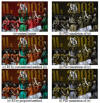 |
Red-Green color blindness is a common problem in males.
A method has been developed that modifies the image on a
TV such that important red and green objects can be more
easily distinguished, yet it is low cost enough to
entertain putting into consumer products. The
images to the left give you a hint on how well it works.
click here |
 |
Cars are getting smarter at helping you to avoid bumping into objects.
Radar is often used to determine the distance of close objects.
Cameras can do some of this, too, but they present a different set of
challenges. This paper describes a way to deal with pedestrians that
may be in your car's path.
click here |
|
|
|
|
|

